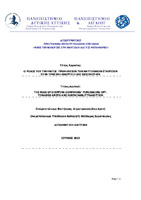| dc.contributor.advisor | SYRIOPOULOS, THEODORE | |
| dc.contributor.author | Δημητρακοπούλου, Αρετή | |
| dc.date.accessioned | 2023-07-20T09:44:06Z | |
| dc.date.available | 2023-07-20T09:44:06Z | |
| dc.date.issued | 2023-06-14 | |
| dc.identifier.uri | https://polynoe.lib.uniwa.gr/xmlui/handle/11400/4748 | |
| dc.identifier.uri | http://dx.doi.org/10.26265/polynoe-4586 | |
| dc.description.abstract | Η ναυτιλιακή βιομηχανία διαδραματίζει ζωτικό ρόλο στο παγκόσμιο εμπόριο, αλλά οι δραστηριότητές της έχουν σημαντικές περιβαλλοντικές επιπτώσεις, συμπεριλαμβανομένων των εκπομπών αερίων θερμοκηπίου, της ρύπανσης και της κατανάλωσης πόρων. Για να μετριαστούν αυτές οι αρνητικές επιπτώσεις, υπάρχει μια αυξανόμενη ανάγκη ενσωμάτωσης πράσινων πρακτικών και στον κύκλο προμηθειών των ναυτιλιακών εργασιών. Αυτό το δοκίμιο διερευνά τις βέλτιστες πράσινες πρακτικές που μπορούν να εφαρμοστούν σε διάφορα στάδια του κύκλου προμηθειών, συμπεριλαμβανομένου του σχεδιασμού, της προμήθειας, της σύναψης συμβάσεων και της διαχείρισης προμηθευτών. Σκοπός της εργασίας είναι να καταδειχθούν αυτές οι πρακτικές, με απώτερο σκοπό οι ναυτιλιακές εταιρείες να ελαχιστοποιήσουν το οικολογικό τους αποτύπωμα, να προωθήσουν τη βιωσιμότητα και να συμβάλουν σε ένα πιο πράσινο μέλλον. Πρέπει να σημειωθεί, ωστόσο, ότι η παρούσα διπλωματική εργασία αναφέρεται σε στρατηγικές και διαδικασίες προμηθειών διαφορετικών ναυτιλιακών επιχειρήσεων, όπως αυτές καθορίζονται και ακολουθούνται από το Τμήμα Προμηθειών τους. Αν και κάποιες διαδικασίες βασίζονται, ιδιαίτερα τα τελευταία χρόνια, σε κανονισμούς που υιοθετούνται από διεθνείς οργανισμούς, δεν πρέπει να θεωρηθεί ότι οι διαδικασίες που περιγράφονται, ανήκουν στην πολιτική του συνόλου των ναυτιλιακών επιχειρήσεων. | el |
| dc.format.extent | 144 | el |
| dc.language.iso | el | el |
| dc.publisher | Πανεπιστήμιο Δυτικής Αττικής | el |
| dc.publisher | Πανεπιστήμιο Αιγαίου | el |
| dc.rights | Αναφορά Δημιουργού - Μη Εμπορική Χρήση - Παρόμοια Διανομή 4.0 Διεθνές | * |
| dc.rights.uri | https://creativecommons.org/licenses/by-nc-sa/4.0/deed.el | * |
| dc.subject | Πράσινες πρακτικές | el |
| dc.subject | Βιωσιμότητα | el |
| dc.subject | Πράσινη ανάπτυξη | el |
| dc.subject | Διαχείριση πράσινων προμηθειών | el |
| dc.subject | ESG | el |
| dc.subject | Δείκτες απόδοσης | el |
| dc.subject | Περιβαλλοντικές επιπτώσεις | el |
| dc.subject | Ναυτιλιακές εταιρείες | el |
| dc.subject | Στόχοι βιώσιμης ανάπτυξης | el |
| dc.subject | Πράσινες προμήθειες | el |
| dc.title | Ο ρόλος του τμήματος προμηθειών των ναυτιλιακών εταιρειών στην πράσινη ανάπτυξη και βιωσιμότητα | el |
| dc.title.alternative | The role of shipping companies' purchasing dept., towards green and sustainable transition | el |
| dc.type | Μεταπτυχιακή διπλωματική εργασία | el |
| dc.contributor.committee | Παπουτσιδάκης, Μιχαήλ | |
| dc.contributor.committee | Drosos, Christos | |
| dc.contributor.faculty | Σχολή Μηχανικών | el |
| dc.contributor.department | Τμήμα Μηχανικών Βιομηχανικής Σχεδίασης και Παραγωγής | el |
| dc.contributor.master | Νέες Τεχνολογίες στη Ναυτιλία και τις Μεταφορές | el |
| dc.description.abstracttranslated | The role of the purchasing department in shipping companies is crucial for facilitating the green and sustainable transition within the industry. As global concerns about environmental impact and sustainability grow, shipping companies are increasingly focused on reducing their carbon footprint and adopting eco-friendly practices. The purchasing department plays a vital role in supporting these objectives by implementing sustainable procurement strategies, sourcing environmentally friendly products and services, and collaborating with suppliers to drive innovation in sustainable solutions. This paper aims to explore the role of the purchasing department in shipping companies towards achieving a green and sustainable transition. It begins by examining the current environmental challenges faced by the shipping industry, including air and water pollution, greenhouse gas emissions, and waste generation. The importance of transitioning to greener practices and adopting sustainable technologies is emphasized.
The research methodology involves a comprehensive review of existing literature, ESG reports, and case studies to identify and analyze the most effective green practices in the procurement cycle. The findings highlight several key strategies that shipping companies can implement to promote sustainability throughout the procurement process. Lastly, the paper highlights the key responsibilities of the purchasing department in driving the green transition. These include conducting thorough supplier evaluations, integrating sustainability criteria into procurement processes, and establishing long-term partnerships with suppliers committed to sustainability. The department's role in promoting innovation and research and development of sustainable solutions is of further investigation. | el |


